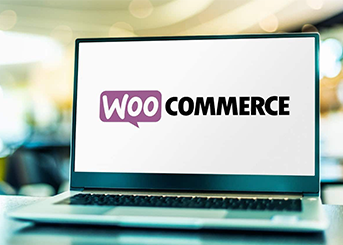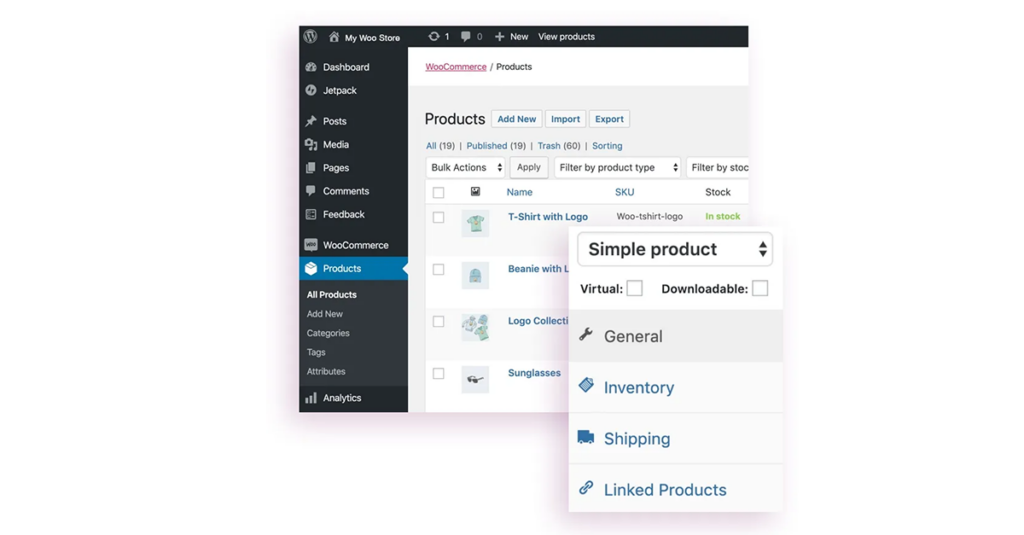
WooCommerce for Enterprise Stores
As the world of eCommerce continues to advance, high-volume online stores require more robust, scalable solutions to keep up with rising consumer expectations—from faster load times to highly personalized shopping experiences.
Meeting these expectations is essential for maintaining customer satisfaction and driving business growth. However, large businesses face unique challenges when streamlining their eCommerce operations and integrating the necessary tools efficiently.
Enter WooCommerceⓇ[1], a powerful eCommerce solution designed to meet the complex needs of enterprise digital stores. WooCommerce offers extensive customization options and a vast ecosystem of extensions and integrations, empowering millions of businesses to sell and scale efficiently while keeping pace with the evolving demands of the eCommerce landscape.
In the following guide, we’ll explore WooCommerce for enterprise stores, diving into the needs of large eCommerce businesses and solutions tailored specifically for them.
Understanding WooCommerce
Before we proceed, it’s important to understand the basics of WooCommerce, including its key feature set.

WooCommerce is the most widely used eCommerce solution for WordPressⓇ[1] sites. While its popularity is often attributed to its flexibility and ease of use, WooCommerce is also a top choice for eCommerce stores because it offers a ton of functionality.
This enables businesses of all sizes to create and manage online stores with WordPress, which comes with its own long list of benefits.
For eCommerce store owners specifically, building on WordPress means you own your entire store and its data, regardless of your hosting choice or future rebuilds. You also gain access to WordPress’ renowned content creation and management tools, expanding the possibilities for your larger digital presence
With WooCommerce up and running, you can transform any WordPress site into an eCommerce store. Here are some of its key features:
- User-friendly interface: WooCommerce boasts an intuitive design and navigation, making it easy for users to set up and manage their online stores. This accessibility ensures that even those without extensive technical knowledge can effectively run an eCommerce site.
- Customization: One of WooCommerce’s most significant strengths is its flexibility. With a wide array of themes, plugins, and extensions, store owners can customize their sites to match unique branding and functionality needs. This adaptability is crucial for businesses looking to create a distinctive online presence.
- Payment options: WooCommerce supports a variety of payment gateways, including PayPal, Stripe, and more. This flexibility provides convenience for both store owners and customers and ensures smooth and secure transactions.
- Product management: WooCommerce simplifies product management with tools for inventory tracking, product variations, and digital downloads. These features make it easy to organize and maintain a diverse product catalog.
- Analytics and reporting: Built-in analytics and reporting tools help store owners track sales performance and make informed business decisions. Access to detailed insights allows for strategic adjustments and growth optimization.
- Active, open-source community: WooCommerce’s strong community support and continuous development make it an attractive, sustainable choice for large businesses.
Understanding these core aspects of WooCommerce will help as you explore its enterprise-level capabilities, which build on the above features for stores with high traffic, heightened security requirements, and high-frequency sales.

Why choose WooCommerce for enterprise?
Enterprise-level businesses require eCommerce solutions that can handle large volumes of traffic and transactions, wide-ranging product catalogs, and complex operational needs.
WooCommerce provides several advantages for these large-scale operations:
Security
While security is typically the first priority for any eCommerce business, enterprise stores require advanced security measures to protect sensitive customer data at scale (more in this below).
WooCommerce can accommodate those requirements and offers numerous security features out of the box. It’s also regularly updated to address vulnerabilities, and it integrates well with many third-party security plugins (and other solutions), helping bolster eCommerce defenses.
Scalability
WooCommerce can efficiently handle high traffic and large product catalogs, making it suitable for enterprises with significant online activity.
By optimizing a WooCommerce storefront with solutions for advanced caching, load balancing, and CDN integration, businesses can ensure fast loading times and smooth user experiences—even during peak periods.
Customization and flexibility
Like WordPress, WooCommerce is open source, allowing enterprises to tailor it to their specific needs.
With countless WooCommerce-specific themes, plugins, and extensions available, businesses can create unique, branded online stores that meet their exact specifications. Custom development and API integrations further enhance WooCommerce’s flexibility, enabling seamless connections with other business tools and systems.
Cost-effectiveness
Compared to many proprietary eCommerce solutions, WooCommerce can be a highly cost-effective option for enterprises. Because it’s open source, WooCommerce has no licensing fees, and businesses can choose hosting providers that fit their budgets.
Additionally, returning to the customization and flexibility noted above, WooCommerce’s extensive ecosystem of integrations allows enterprises to add only the features they need, avoiding unnecessary expenses.
Choosing WooCommerce for your enterprise means opting for a secure, scalable solution that grows with your business. It empowers you to meet consumer demands with confidence, ensuring operational efficiency and enhanced customer satisfaction.

Key WooCommerce features for enterprise stores
To thrive in the competitive eCommerce landscape, enterprise-level stores need advanced features that cater to their complex needs.
WooCommerce offers a suite of powerful tools designed to support the demands of large-scale operations, ensuring efficiency, security, and global reach.
Advanced product management
WooCommerce provides robust product management capabilities essential for enterprises. These include support for various product types (physical, digital, and subscription), complex product variations, bulk editing, and inventory management. With these powerful tools, enterprises can efficiently manage extensive product catalogs.
Seamless integration with business tools
Enterprises often rely on a variety of tools and systems to manage their operations. WooCommerce supports seamless integration with numerous third-party tools, including CRM systems, ERP software, and marketing automation platforms. These integrations streamline operations and improve data flow across the organization.
Global selling capabilities
WooCommerce also enables enterprises to sell globally, as it supports multiple currencies, languages, and tax configurations. This makes WooCommerce suitable for businesses with an established international presence, or a growing international footprint.
Additionally, integrations with shipping carriers and logistics providers can further simplify the fulfillment process for global orders.
Enhanced security features
Security is a top priority for enterprises, and WooCommerce offers several features to protect online stores. These include secure payment processing, data encryption, and regular security updates. By following best practices and utilizing security plugins, businesses can ensure their stores are safe from threats.
With these advanced features, WooCommerce empowers enterprise stores to operate efficiently and securely while reaching a global market. By leveraging WooCommerce’s capabilities, enterprises can enhance their operational workflows, provide exceptional customer experiences, and confidently scale their eCommerce presence.

Optimizing WooCommerce for enterprise stores
While advanced features are helpful for enterprise stores, performance optimization is crucial for providing a seamless shopping experience and maintaining customer satisfaction. Several strategies can help achieve this:
High-quality hosting
Choosing a reliable hosting provider is essential for optimal performance. Managed hosting solutions offer server configurations tailored to the platform, ensuring fast loading times and minimal downtime.
Features such as automatic backups, staging environments, and expert support further enhance the hosting experience.
Caching and CDN integration
Implementing advanced caching mechanisms and integrating a Content Delivery Network (CDN) can significantly improve website performance. Caching reduces server load by storing static versions of pages, while CDNs distribute content across multiple servers worldwide, reducing latency and speeding up delivery.
For enterprise eCommerce stores, both advanced caching and CDN integration can lead to faster page load times, enhanced user experience, and improved SEO rankings.
Load balancing
As noted above, load balancing can be an extremely effective performance enhancement for high-traffic enterprise stores as it distributes incoming traffic across multiple servers, preventing any single server from becoming overwhelmed.
This ensures consistent performance and availability, even during peak periods.
Database optimization
Optimizing the WooCommerce database can also improve site performance by reducing query times and minimizing bloat. Regular database maintenance, such as cleaning up unused data and optimizing tables, helps keep the store running smoothly.
By implementing these strategies, enterprise WooCommerce stores can achieve exceptional performance and reliability, ensuring a seamless shopping experience, enhanced customer satisfaction, and reliable scalability during peak traffic periods.
WooCommerce integration capabilities
WooCommerce’s integration capabilities offer a significant advantage for enterprise businesses. Seamless integration with various tools and systems can enhance operational efficiency and create a more cohesive eCommerce ecosystem.
API integrations
WooCommerce’s robust REST API allows for seamless integration with other business systems, such as CRM, ERP, and accounting software. These integrations facilitate data synchronization and streamline processes, reducing manual work and improving accuracy.
Payment gateways
As mentioned above, WooCommerce supports numerous payment gateways, enabling enterprises to offer a variety of payment options to customers. Integration with gateways like PayPal, Stripe, and Authorize.Net ensures secure and convenient transactions. Enterprises can also add custom payment methods to cater to specific business needs.
Marketing and analytics tools
Integrating marketing automation and analytics tools with WooCommerce enhances marketing efforts and provides valuable insights. Popular integrations include Google Analytics, Mailchimp, HubSpot, and various social media platforms. These tools help businesses track performance, engage customers, and optimize marketing strategies.

WooCommerce security measures for enterprise stores
Ensuring the security of an enterprise-level online store is paramount. WooCommerce offers several features and best practices to protect sensitive data and maintain a secure environment.
Secure payment processing
Payment processing is one of the most important elements of eCommerce security, and WooCommerce offers wide optionality for integrating with secure payment gateways that comply with industry standards for data protection.
The encryption protocols and secure transmission methods employed by these gateways offer robust protection against potential cyber threats. This level of security is essential for maintaining customer trust and ensuring a safe shopping experience, ultimately contributing to the overall success of your online store.
Regular updates and maintenance
Keeping WooCommerce and its extensions up to date is crucial for security. Regular updates address vulnerabilities and enhance the platform’s functionality, ensuring any newly discovered security issues are promptly fixed. This proactive approach is vital in preventing potential exploits that could compromise sensitive data.
Routine maintenance is equally important for keeping stores secure and performant. This includes monitoring system performance to identify and address issues before they become critical, optimizing the database for improved speed and efficiency, and managing regular backups to ensure quick recovery in case of data loss or breach.
Security plugins
Several security plugins are available for WooCommerce, providing enterprise stores with additional layers of protection.
Plugins like Wordfence, Sucuri, and iThemes Security offer features such as firewall protection, malware scanning, and login security. Implementing these plugins helps safeguard stores against various threats, providing peace of mind for both store owners and customers.
By leveraging the advanced features of these plugins, enterprises can ensure a higher level of security, protect sensitive data, and maintain the integrity of their online stores. This not only helps prevent potential breaches but also boosts customer trust and confidence.
Regular security audits
Conducting regular security audits is essential for identifying and addressing potential vulnerabilities. Audits can help ensure that security measures are effective and up to date, providing an additional layer of protection.
By implementing these comprehensive security measures, enterprises can create a robust defense against potential threats and ensure the safety and integrity of their online stores.
Best practices for enterprise WooCommerce implementation
Implementing WooCommerce for an enterprise store requires thoughtful planning and execution to ensure optimal performance, security, and scalability.
By following best practices, businesses can leverage WooCommerce’s powerful capabilities to meet their complex needs and provide a seamless shopping experience. Below, we outline key strategies and considerations for successfully deploying WooCommerce in an enterprise environment.
Plan and strategy
Before implementing WooCommerce, enterprises should develop a comprehensive plan and strategy. This includes defining business goals, identifying key requirements, and outlining the implementation process. A well-thought-out plan ensures a smooth transition and sets the stage for success.
Choose the right hosting provider
Selecting a hosting provider with tools and services tailored to WooCommerce is critical. Reliable hosting guarantees minimal downtime and fast loading times, which are essential for enterprise-level operations.
Leverage professional expertise
Engage with WooCommerce experts or hire professional developers with experience in large-scale eCommerce implementations. Their expertise can help customize the platform to meet specific business needs, integrate essential tools, and ensure the store is optimized for performance and security.
Optimize for performance
Implement advanced performance optimization techniques, such as caching, CDN integration, and load balancing. Regularly monitor and optimize the WooCommerce database to reduce query times and minimize bloat. These measures enhance the user experience by ensuring fast, reliable access to the store, even during peak traffic periods.
Remain vigilant about security
Prioritize security by keeping WooCommerce and its extensions up to date. Implement security plugins for additional protection, or find advanced security solutions, such as WP Engine’s Global Edge Security, to bolster your site’s defenses. Regularly audit security practices and protocols to safeguard sensitive customer data and maintain a secure online environment.
Integrate essential business tools
Integrate WooCommerce with other critical business systems, such as CRM, ERP, and marketing automation tools. Utilize WooCommerce’s robust REST API to ensure smooth data synchronization and streamline operations, enhancing overall efficiency.
Implement continuous monitoring and support
Establish continuous monitoring and support mechanisms to promptly address any issues or performance bottlenecks. Regularly review and refine the implementation strategy based on business needs and evolving eCommerce trends.
These best practices will help enterprises successfully implement WooCommerce, creating a powerful, scalable eCommerce solution that drives growth and meets the demands of a competitive digital landscape.
Power your enterprise WooCommerce store with confidence
Embracing WooCommerce for your enterprise store means opting for a secure, customizable eCommerce experience capable of handling the complexities of high-volume operations.
By implementing best practices, such as selecting high-quality hosting, enterprises can optimize performance, enhance security, and ensure seamless integration with essential business tools.
WP Engine’s managed hosting offers tailored solutions, including optimized server configurations and expert support, and when combined with the powerful solutions in our eCommerce Performance Pack, your enterprise store runs smoothly and efficiently.
This strategic approach empowers businesses to meet consumer demands with confidence, driving growth and maintaining a competitive edge in the ever-evolving eCommerce landscape.
Chat with a representative today to learn more!
